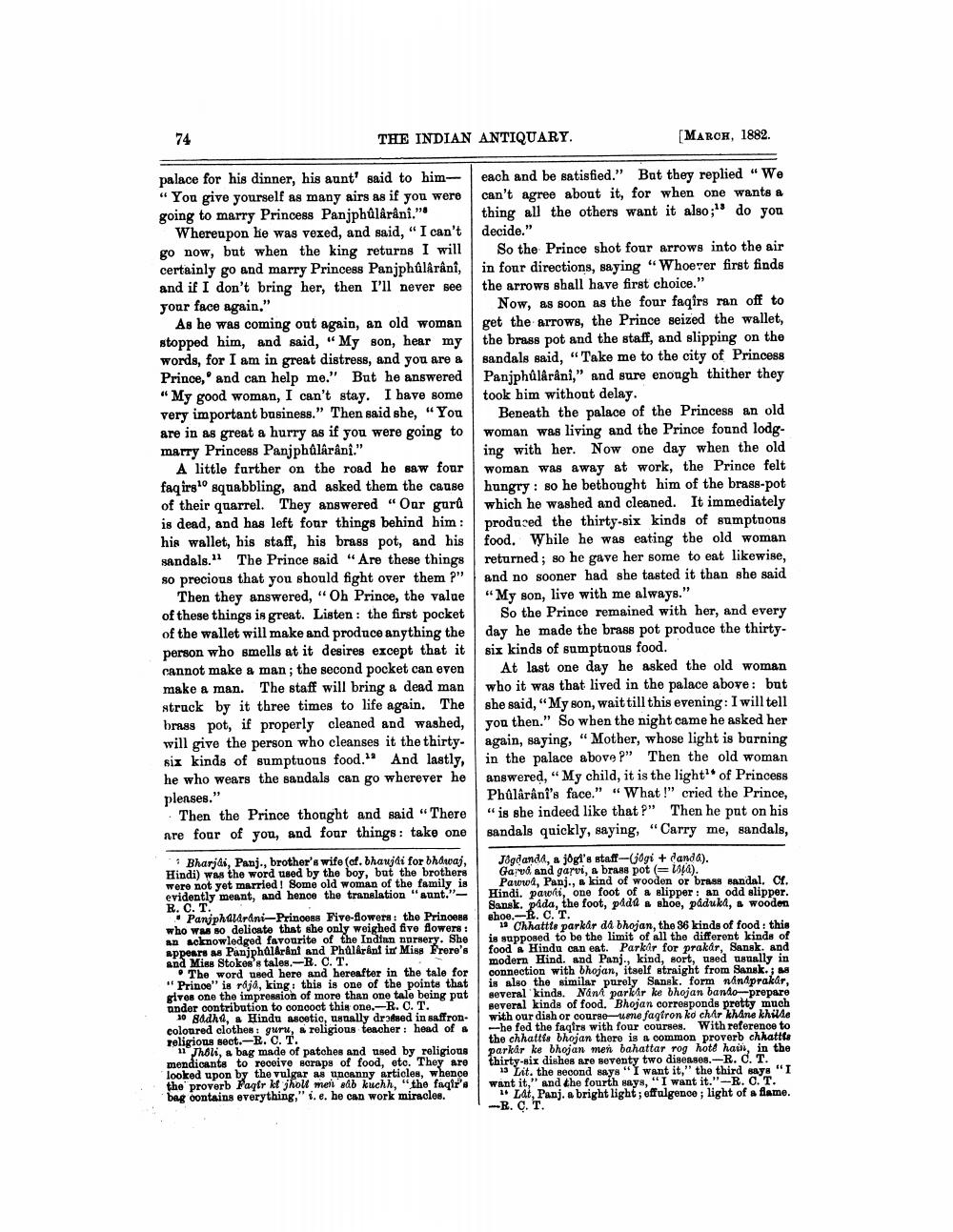________________
74
THE INDIAN ANTIQUARY.
palace for his dinner, his aunt' said to him"You give yourself as many airs as if you were going to marry Princess Panjphâlârâni."
Whereupon he was vexed, and said, "I can't go now, but when the king returns I will certainly go and marry Princess Panjphâlârânî, and if I don't bring her, then I'll never see your face again."
As he was coming out again, an old woman stopped him, and said, "My son, hear my words, for I am in great distress, and you are a Prince, and can help me." But he answered "My good woman, I can't stay. I have some very important business." Then said she, "You are in as great a hurry as if you were going to marry Princess Panjphâlârânî."
A little further on the road he saw four faq irs squabbling, and asked them the cause of their quarrel. They answered "Our gurû is dead, and has left four things behind him: his wallet, his staff, his brass pot, and his sandals.11 The Prince said "Are these things so precious that you should fight over them ?"
Then they answered, "Oh Prince, the value of these things is great. Listen: the first pocket of the wallet will make and produce anything the person who smells at it desires except that it cannot make a man; the second pocket can even make a man. The staff will bring a dead man struck by it three times to life again. The brass pot, if properly cleaned and washed, will give the person who cleanses it the thirtysix kinds of sumptuous food. And lastly, he who wears the sandals can go wherever he pleases."
Then the Prince thought and said "There are four of you, and four things: take one
Bharjai, Panj., brother's wife (cf. bhaujai for bhowaj, Hindi) was the word used by the boy, but the brothers were not yet married! Some old woman of the family is evidently meant, and hence the translation "aunt."R. C. T.
Panjphalarini-Princess Five-flowers: the Princess who was so delicate that she only weighed five flowers: an acknowledged favourite of the Indian nursery. She appears as Panjphâlârâni and Phâlârânt in Miss Frere's and Miss Stokes's tales.-R. C. T.
[MARCH, 1882.
each and be satisfied." But they replied "We can't agree about it, for when one wants a thing all the others want it also; do you decide."
The word used here and hereafter in the tale for "Prince" is rája, king: this is one of the points that gives one the impression of more than one tale being put ander contribution to concoct this one.-R. C. T.
10 8ddha, a Hindu ascetic, usually dressed in saffroncoloured clothes: guru, a religious teacher: head of a religious sect.-B. C. T.
11 Jholi, a bag made of patches and used by religious mendicants to receive scraps of food, etc. They are looked upon by the vulgar as uncanny articles, whence the proverb Faqir kt jholt men sab kuchh, "the faqir's bag contains everything," i. e. he can work miracles."
So the Prince shot four arrows into the air in four directions, saying "Whoever first finds the arrows shall have first choice."
Now, as soon as the four faqîrs ran off to get the arrows, the Prince seized the wallet, the brass pot and the staff, and slipping on the sandals said, "Take me to the city of Princess Panjphâlârâni," and sure enough thither they took him without delay.
Beneath the palace of the Princess an old woman was living and the Prince found lodging with her. Now one day when the old woman was away at work, the Prince felt hungry so he bethought him of the brass-pot which he washed and cleaned. It immediately produced the thirty-six kinds of sumptuous food. While he was eating the old woman returned; so he gave her some to eat likewise, and no sooner had she tasted it than she said "My son, live with me always."
So the Prince remained with her, and every day he made the brass pot produce the thirtysix kinds of sumptuous food.
At last one day he asked the old woman who it was that lived in the palace above: but she said, "My son, wait till this evening: I will tell you then." So when the night came he asked her again, saying, "Mother, whose light is burning in the palace above ?" Then the old woman answered, "My child, it is the light of Princess Phûlârânî's face." "What!" cried the Prince, "is she indeed like that?" Then he put on his sandals quickly, saying, "Carry me, sandals,
Jogdanda, a jogi's staff-(jogi + danda). Gared and garvi, a brass pot (lata).
Pawwa, Panj., a kind of wooden or brass sandal. Cf. Hindi. pawi, one foot of a slipper: an odd slipper. Sansk. pida, the foot, pádů a shoe, páduka, a wooden shoe.-R. C. T.
12 Chhattte parkir dá bhojan, the 36 kinds of food: this is supposed to be the limit of all the different kinds of food a Hindu can eat. Parker for prakár, Sansk. and modern Hind. and Panj., kind, sort, used usually in connection with bhojan, itself straight from Sansk.; as is also the similar purely Sansk. form nániprakar, several kinds. Nána parkir ke bhojan bando-prepare several kinds of food. Bhojan corresponds pretty much with our dish or course-uene faqiron ko char khane khille -he fed the faqirs with four courses. With reference to the chhattis bhojan there is a common proverb chhattis parkar ke bhojan men bahattar rog hote hain, in the thirty-six dishes are seventy two diseases.-R. C. T.
13 Lit. the second says "I want it," the third says "I want it," and the fourth says, "I want it."-R. C. T. Lat, Panj. a bright light; effulgence; light of a flame. -R. C. T.




